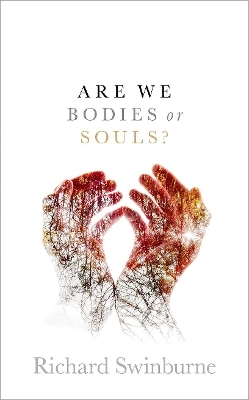
Are We Bodies or Souls?
Seiten
2019
Oxford University Press (Verlag)
978-0-19-883149-5 (ISBN)
Oxford University Press (Verlag)
978-0-19-883149-5 (ISBN)
What makes us human? Richard Swinburne presents new philosophical arguments, supported by modern neuroscience, for the view that we are immaterial souls sustained in existence by our brains.
What are humans? What makes us who we are?
Many think that we are just complicated machines, or animals that are different from machines only by being conscious. In Are We Bodies or Souls? Richard Swinburne comes to the defence of the soul and presents new philosophical arguments that are supported by modern neuroscience. When scientific advances enable neuroscientists to transplant a part of brain into a new body, he reasons, no matter how much we can find out about their brain activity or conscious experiences we will never know whether the resulting person is the same as before or somebody entirely new. Swinburne thus argues that we are immaterial souls sustained in existence by our brains. Sensations, thoughts, and intentions are conscious events in our souls that cause events in our brains. While scientists might discover some of the laws of nature that determine conscious events and brain events, each person's soul is an individual thing and this is what ultimately makes us who we are.
What are humans? What makes us who we are?
Many think that we are just complicated machines, or animals that are different from machines only by being conscious. In Are We Bodies or Souls? Richard Swinburne comes to the defence of the soul and presents new philosophical arguments that are supported by modern neuroscience. When scientific advances enable neuroscientists to transplant a part of brain into a new body, he reasons, no matter how much we can find out about their brain activity or conscious experiences we will never know whether the resulting person is the same as before or somebody entirely new. Swinburne thus argues that we are immaterial souls sustained in existence by our brains. Sensations, thoughts, and intentions are conscious events in our souls that cause events in our brains. While scientists might discover some of the laws of nature that determine conscious events and brain events, each person's soul is an individual thing and this is what ultimately makes us who we are.
Richard Swinburne was Professor of the Philosophy of the Christian Religion at the University of Oxford from 1985 until 2002. Since then he has continued to lecture in many different countries. His published works include a trilogy on the philosophy of theism, the central title being The Existence of God, Second Edition (Oxford 2004), a tetralology of books on the meaning and justification of central Christian doctrines, and Mind, Brain, and Free Will (Oxford 2013). He is a Fellow of the British Academy.
1: Introduction
2: Physicalism and Property Dualism
3: Theories of Personal Identity
4: Descartes's Argument for the Soul
5: We know who we are
6: Souls and bodies interact
7: Could science explain souls?
8: Guide to Further Reading
| Erscheinungsdatum | 15.06.2019 |
|---|---|
| Verlagsort | Oxford |
| Sprache | englisch |
| Maße | 141 x 221 mm |
| Gewicht | 334 g |
| Themenwelt | Sachbuch/Ratgeber ► Natur / Technik |
| Geisteswissenschaften ► Philosophie | |
| ISBN-10 | 0-19-883149-8 / 0198831498 |
| ISBN-13 | 978-0-19-883149-5 / 9780198831495 |
| Zustand | Neuware |
| Informationen gemäß Produktsicherheitsverordnung (GPSR) | |
| Haben Sie eine Frage zum Produkt? |
Mehr entdecken
aus dem Bereich
aus dem Bereich
eine neue Sicht auf unsere Emotionen
Buch | Hardcover (2023)
Rowohlt Taschenbuch (Verlag)
CHF 39,20
was die Physik über die Welt und das Leben verrät
Buch | Hardcover (2023)
Siedler (Verlag)
CHF 36,40


